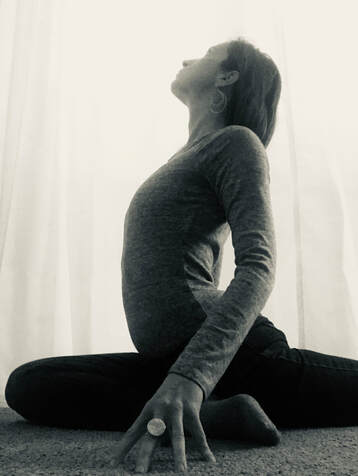 When I first retired from my fancy-pants career in 2011 to teach the Yoga full time, I was surprised to find myself in a remarkably precarious position that did not involve being upside down or folding any part of myself in on itself like a transformer. I had anticipated showing off my badass body folding skills, but I wasn’t ready for the real challenge. I found myself on a pedestal. People were looking up to me - modeling their behavior, their dress, their dietary choices after mine. And I let them. Yes! I thought. I’ve never had a traffic ticket, never used drugs… I really am morally superior. Go ahead and do as I do, and you’ll crush life. Except they couldn’t quite figure it out, so I had to help them. Stay after class and sort through their problems, wipe their tears, and offer advice. Lots of it. Good advice, too, if I do say so myself. And this was very effective! It didn’t change their lives for the better (or mine, if I’m honest), but it did distract me from the elephant-sized problem I was trying to ignore in my own life. The details, as always, are irrelevant. Except to say that I could not outrun nor could I dance faster than my own misery and I came tumbling right down off of that pedestal in a public way. Twice. Loads of people abandoned me, and I don’t blame them for a second. I was dishonest and “helpy.” Others became angry and felt betrayed, others wanted to help, and a few showed me how to teach. They sat there as I lay beneath shame and a badly bruised ego, crying next to the pedestal that used to hold my impeccable moral compass and said things like “I know,” and “that must be hard,” and “you will live through this.” They did not fix me, nor did they attempt to. And they were right, I lived through it. If you teach long enough, this will happen. Both the pedestal and the falling off. It will happen over and over again until you figure out a few things about yourself. Here are the few that I learned, in a form that I hope you find useful. THE DETAILS ARE IRRELEVANT: You do not have to tell your students your story. The whole story or part of it. But do not pretend that you belong on a pedestal, and if you find that a student is placing you up there, kindly remind them that you’re more comfortable on the ground. Authenticity is the jam, and does not require you to bare your soul in class or on the internet. NO ONE IS BROKEN: There is absolutely a power dynamic in the student/teacher relationship, and it’s important to acknowledge and respect that. However, believing that you are ‘better than’ requires you to also believe that they are ‘worse than’. You might not be doing this consciously, and that is my invitation here. You are a yoga teacher, and fixing people is not in your job description. YOU ARE NOT ACTUALLY ABLE (OR ALLOWED) TO FIX PEOPLE: Neither is anyone else. Dentists can repair broken teeth, doctors can stitch broken skin, veterinarians can prevent your dog from licking a wound, but no one can fix another person. All we can do is cultivate the circumstances where healing can occur. I do this the way my people did this for me, with a few key phrases and mostly just listening. Here are a few of my phrases. They are not brilliant, but they are easy to memorize and remind me to shut my mouth. “That must be hard” “I don’t know what to say” “I’m glad you’re here” BONUS: YOU ACTUALLY DO NOT HAVE TO LISTEN TO YOUR STUDENTS, FOR THE RECORD This is not harsh, this is responsible. If you’re present to teach a class, that does not necessarily mean you need to listen. Remember, the details are irrelevant? It’s ok - healthy - remarkable, in some circumstances to direct someone to a more appropriate audience. “I’m going to stop you - thank you for trusting me to hear your story - I’d love to connect you with someone who can offer you the support you need.” You see? Boundaries are a sign of health.
0 Comments
Leave a Reply. |
PROGRAMS for Yoga Teachers:YIN Archives
September 2019
Categories
All
|
 RSS Feed
RSS Feed
